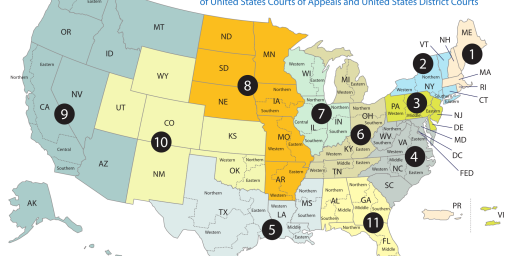Absurd, Pointless Lawsuit Against Filibuster Dismissed By Federal Appeals Court
An unsurprising result in a lawsuit that never should have been filed
Nearly two years ago, the public advocacy group Common Cause filed a lawsuit in Federal Court asserting that the Senate filibuster was unconstitutional. As I noted at the time, the lawsuit was pretty much a joke from a legal point of view given the fact that the Constitution clearly authorizes both Houses of Congress to establish their own rules and that the Federal Courts have been historically reluctant to interfere in the internal operations of the legislative branch unless some clear Constitutional principle is implicated. In the case of the filibuster, that clearly is not the case. Not surprisingly, the lawsuit was dismissed by a Federal District Court Judge just months after it was filed, at which point Common Cause and the other Plaintiffs appealed the matter to the D.C. Circuit Court of Appeals. Today, the Court of Appeals affirmed the lower court ruling and dismissed the case:
The D.C. Circuit Court of Appeals rejected Common Cause’s case, which argued that the Senate filibuster was unconstitutional.
Common Cause — a liberal non-profit — blamed the 60-vote threshold needed to overcome a filibuster for lack of progress on House passed bills, the DISCLOSE Act and the DREAM Act. The organization argued that Senate votes should be held to a simple majority, as it is in the House or Representatives.
D.C.’s lower court had already dismissed Common Cause v. Joseph Biden in 2012, saying Common Cause lacked standing to sue.
On Tuesday, a three-judge panel on the D.C. Circuit Court of Appeals also dismissed the case but for different reasons.“We agree with the district court that Common Cause lacks standing, but for a different reason,” the senior Circuit Court judge Arthur Randolph wrote in the opinion. “Our analysis focuses on whom Common Cause chose to sue — or, more to the point, not to sue.”
Under current Senate rules, the minority party can force a cloture vote before a final passage vote — ending debate on a bill requires 60 votes. Common Cause argued that forcing lawmakers to get 60 votes to advance legislation violated the Constitutional principle of majority rule. But the court ruled that because the Senate determines its own rules, Common Cause sued the wrong person — Vice President Joe Biden, who acts as the president of the Senate.
“In suing only non-Senators, Common Cause is ‘Hoist with [its] own petar,'” Randolph wrote, citing William Shakespeare’s “Hamlet.”
The Senate is able to vote to change its rules at the beginning of each new Congress. Even last year, the Senate voted to change filibuster rules on most presidential nominations. Only a simple majority is now needed to advance nominees instead of the previously needed 60-votes.
“Here, Common Cause does not identify anything the defendants did (or refrained from doing) to cause its alleged injuries,” Randolph wrote. “The Senate established the cloture rule and the Senators voting against cloture doomed the DREAM and DISCLOSE bills. It is hard to imagine how any of the defendants bore responsibility for that outcome.”
On it’s face, the Court’s reasons here seems odd. Vice President Biden was the named Defendant in the lawsuit not because of anything he did but due to the fact that he is the President of the Senate pursuant to the Constitution. On some level, his presence as the named Defendant is no different from the Secretary of a Cabinet Department being the named Defendant in a lawsuit related to something involving that department. That’s why, for example, Kathleen Sibelius is the named Defendant in every lawsuit challenging some portion of the Affordable Care Act. It’s unclear why this wouldn’t apply similarly to Vice-President Biden in a case like this.
In the end, the result likely would have been the same if the Appeals Court had determined that Biden was a proper Defendant in this case. There simply isn’t any Constitutional authority for the arguments that the lawsuit makes here, and the language of the Constitution that grants the House and Senate the authority to make their own rules is plain on its face. There may well be policy arguments against the filibuster, or at least against its use in judicial nominations, but there’s no legal authority at all for the argument that the filibuster is unconstitutional. Common Cause should’ve known that when they filed the suit and they ought to be ashamed of themselves for wasting the time of four Federal Judges, and their clerks, with such a frivolous claim.
Here’s the opinion:







Honestly, there must be enough smart people around there who could have counseled them to NOT waste the court’s time with this suit. Did they do this solely as a publicity stunt?
@al-Ameda:
Would be fun to graph press releases about the suit and donations.